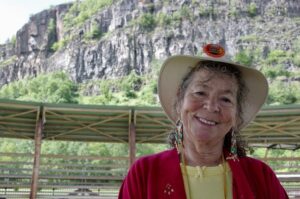Fort William First Nation Elder recounts Papal Visit
Trigger warning: readers may be triggered by the recount of Indian Residential Schools. To access a 24-hour National Crisis Line, call: 1-866-925-4419. Community Assistance Program (CAP) can be accessed for citizens of the Anishinabek Nation: 1-800-663-1142

By Rick Garrick
EDMONTON — Fort William Elder Rita Fenton is calling for funding for proper burials of children’s remains discovered at former Indian Residential Schools after travelling to Edmonton to support Survivors and Elders at Pope Francis’ Holy Mass. Fenton says she saw the pain and tears on the faces of Survivors while watching the Pope’s Indian Residential School apology on television.
“The Pope saying ‘I’m sorry’ is just words; he left out the reference to the sexual abuses,” says Fenton, who went to the Roman Catholic-run Mission Bay Indian Day School in Fort William First Nation and graduated with a Masters in Social Work from Wilfred Laurier University in 2017. “Last year when the news broke out about [the 215 potential grave sites of] children being found at the former Residential School in Kelowna, B.C., that really tore my heart out.”
Fenton says she couldn’t sleep after the potential grave sites were found at the former Residential School.
“It really affected me because I thought of the babies and children that were found and I felt compassion for the families,” Fenton says. “There should be funding for people to bring their children back home for a proper burial so they could have some closure, and the apology should have included that.”
Fenton says there should also be funding for healing lodges for ongoing healing.
“There is no stop to healing, it is ongoing,” Fenton says. “There’s Elders I see with pain on their faces, hurt on their faces and still crying. They haven’t had closure.”
Fenton says she was disturbed by the conditions the Survivors faced at the Holy Mass, held July 26 at Commonwealth Stadium in Edmonton.
“There were very steep stairs to go down — there were Elders that could not make it down those stairs,” Fenton says. “Needless to say, it was not very well thought of in regards to the Survivors or Elders in that respect, especially the people in wheelchairs.”
Fenton says the conditions were “very heartbreaking,” noting that she did not go to Edmonton the see the Pope but to be a support for the Survivors of Indian Residential Schools.
“We waited hours before the mass started in the hot sun — the stadium was wide open, it was very hot that day and then it rained a bit,” Fenton says. “We weren’t allowed any umbrellas in there to protect us from the sun or rain … because of the heavy security for the Pope. There were police all over, ambulances.”
Fenton says there were thousands of people in attendance, who had to be at the Commonwealth Stadium by 9 a.m. for the Holy Mass.
“We were there for hours in the glaring sun, I had to get a blanket to cover my arms,” Fenton says. “They were giving water away, but in regards to anything food-wise, there was nothing for people who were diabetic and needed snacks. More thought should have been given to the Survivors and Elders that went to see the Pope.”
Fenton says she was raised as a Roman Catholic and travelled to Rome in 2012 for the canonization of Kateri Tekakwitha, the first Indigenous person from Canada to be honoured as a Saint.
“I was very much into Christianity at that time, which I am not today,” Fenton says, noting that she was a staunch Roman Catholic and very involved in the church for most of her life. “I practiced my religion and started learning my traditional ways/teachings in my 30s.”
Fenton says she lives a spiritual life today after leaving the Roman Catholic church in 2016.
“I thank the Creator every day for another day of life,” Fenton says. “We must never forget the lives of the babies and children that never came home, that never got to live their lives and we must always remember the Survivors of Residential Schools.”


